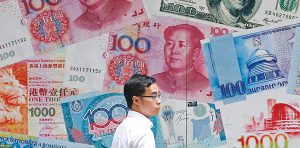Bloomberg
China’s central bank injected additional liquidity into the financial system for the first time since June as a growing mortgage-payment boycott and a virus flareup leads to a sense of crisis.
The People’s Bank of China (PBOC) boosted the size of its daily short-term cash operation to 12 billion yuan ($1.8 billion) from 3 billion yuan, resulting in a modest net injection of 9 billion yuan, the first overall infusion since June 30.
The authorities are adding liquidity despite money-market rates being near the lowest in more than a year as concerns escalated over a housing-market downturn and a Covid Zero policy that’s weighing on economic growth. Regulators have called emergency meetings with banks amid reports that home buyers are refusing to pay mortgages with developers stalling on construction.
In another sign Chinese policy makers are seeking to ease a liquidity crunch facing real-estate companies, a newspaper reported that the banking regulator has urged lenders to support developers. State media have cited analysts warning that the stability of the financial system may be hurt if the mortgage payment boycott spreads with reports saying at least 230 projects have been affected.
“Investors and the market are not sure what the end game is,†said Hui Shan, an economist at Goldman Sachs Group Inc. “The core issue here is for the government to step in quickly to boost confidence, to solve the problem at hand, and also provide more clarity to the market and investors on how this downturn in the property sector is going to be resolved.â€
The regulatory report helped boost sentiment, with a gauge of Chinese real estate firms rising 3% to snap a five-day decline.
Earlier this month, the PBOC rolled over its maturing policy loans and started withdrawing cash from the banking system in a sign it’s moving away from its crisis-era policy easing.
While a senior official signalled last week that further interest-rate cuts are unlikely, Governor Yi Gang said at a meeting of Group-of-20 central bank governors and finance ministers that it will step up the implementation of its prudent monetary policy to provide stronger economic support.
The seven-day interbank lending rate has risen over the past week but remains below the central bank’s benchmark rate. The PBOC’s decision to inject more funds was also flagged by some analysts due to the seasonal demand for cash from corporates in the middle of the month to cover their tax payments.
With borrowing rates between banks so low, traders are taking advantage of cheap short-term cash to buy government bonds and pocketing the difference. Yields on China’s one-year sovereign note fell three basis points to a two-year low of 1.75%.
Still, providing more liquidity may have limits, with the repurchase rate trending below the benchmark lending rate of 2.1%, said Ken Cheung, a strategist at Mizuho Bank Ltd. in Hong Kong. There’s only a “marginal benefit of pumping extra liquidity into the interbank market,†he said.
 The Gulf Time Newspaper One of the finest business newspapers in the UAE brought to you by our professional writers and editors.
The Gulf Time Newspaper One of the finest business newspapers in the UAE brought to you by our professional writers and editors.
